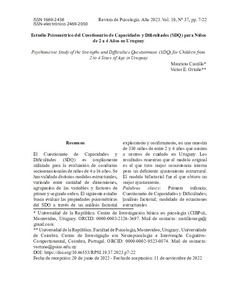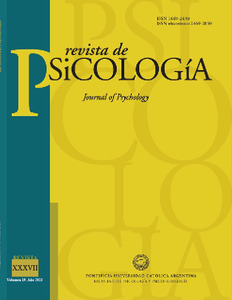Please use this identifier to cite or link to this item:
https://repositorio.uca.edu.ar/handle/123456789/16553| Título: | Estudio psicométrico del cuestionario de capacidades y dificultades (SDQ) para niños de 2 a 4 años en Uruguay Psychometric study of the strengths and difficulties questionnaire (SDQ) for children from 2 to 4 years of age in Uruguay |
Autor: | Castillo, Mauricio Ortuño, Víctor E. |
Palabras clave: | INFANCIA; ANALISIS FACTORIAL; CUESTIONARIO DE CAPACIDADES Y DIFICULTADES; CONDUCTA INFANTIL; PSICOLOGIA | Fecha de publicación: | 2023 | Editorial: | Pontificia Universidad Católica Argentina. Facultad de Psicología y Psicopedagogía | Cita: | Castillo, M., Ortuño, V. E. Estudio psicométrico del cuestionario de capacidades y dificultades (SDQ) para niños de 2 a 4 años en Uruguay [en línea]. Revista de Piscología. 2023,19 (37). doi: 10.46553/RPSI.19.37.2023.p7-22. Disponible en: https://repositorio.uca.edu.ar/handle/123456789/16553 | Resumen: | Resumen: El Cuestionario de Capacidades y Dificultades (SDQ) es ampliamente utilizado para la evaluación de conductas socioemocionales de niños de 4 a 16 años. Se han validado distintos modelos estructurales, variando entre cantidad de dimensiones, agrupación de las variables y factores de primer y segundo orden. El siguiente estudio busca evaluar las propiedades psicométricas del SDQ a través de un análisis factorial exploratorio y confirmatorio, en una muestra de 330 niños de entre 2 y 4 años que asisten a centros de cuidado en Uruguay. Los resultados muestran que el modelo original es el que tuvo mejor consistencia interna pero un deficiente ajustamiento estructural. El modelo bifactorial fue el que obtuvo un mejor ajustamiento. Abstract: The Skills and Difficulties Questionnaire (SDQ) is widely used for the assessment of socio-emotional behaviors in children from 4 to 16 years of age. Different structural models have been validated, varying between the number of dimensions, grouping of variables and first and second order factors. The following study seeks to evaluate the psychometric properties of the SDQ through an exploratory and confirmatory factor analysis, in a sample of 330 children between the ages of 2 and 4 who attend care centers in Uruguay. The results show that the original model is the one with the best internal consistency but poor structural fit. The bifactorial model was the one that obtained the best adjustment |
Cobertura Espacial: | Uruguay | URI: | https://repositorio.uca.edu.ar/handle/123456789/16553 | ISSN: | 2469-2050 (online) 1669-2438 (impreso) |
Disciplina: | PSICOLOGIA | DOI: | 10.46553/RPSI.19.37.2023.p7-22 | Derechos: | Acceso abierto | Fuente: | Revista de Piscología. 2023, 19 (37) |
| Appears in Collections: | RdP - 2023 Vol. 19 nro. 37 |
Files in This Item:
| File | Description | Size | Format | |
|---|---|---|---|---|
| estudio-psicométrico-cuestionario.pdf | 1,84 MB | Adobe PDF |  View/Open | |
| cover_issue_472_es_AR.png | 119,55 kB | image/png |  View/Open |
Page view(s)
117
checked on Apr 27, 2024
Download(s)
191
checked on Apr 27, 2024
Google ScholarTM
Check
Altmetric
Altmetric
This item is licensed under a Creative Commons License

